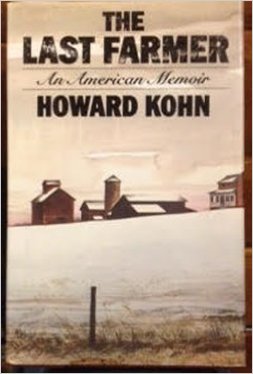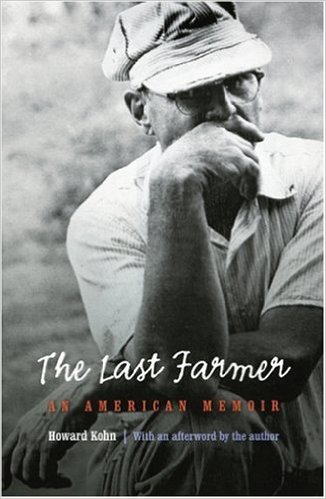Farm Wisdom: People Who Make Mistakes Shouldn’t Be Bailed Out
 Moral wisdom comes from successful families, but won the hard way, passed from generation to generation.
Moral wisdom comes from successful families, but won the hard way, passed from generation to generation.
In his book The Last Farmer: An American Memoir, Howard Kohn revisits his boyhood Midwestern farm family after years away in big Northeastern cities. He is humbled to find a deep-seated moral core and common sense that have been embodied in strong-willed fathers, mothers, and grandparents in the area, qualities that are all but missing in the larger American society.
“Halfway up the Lake Huron coast of Michigan is the Saginaw Valley, dug and silted by glaciers, and near the northern extreme of the valley, in a Germanic community, is the farm that Heinrich Kohn homesteaded and passed on to his son, Johann Kohn, who passed it to his son, Fredrick Kohn, who is my father,” says Howard. Actually, he is not only chronicling the lives of German farm families throughout the Midwest—but immigrant-based rural lives in past generations, especially before television took over the job of teaching values.
True, the Kohn family were stalwarts of their local church, but it was the father, not the minister, who saw that teachings were inculcated in the family. The pioneer principle of self-reliance was the cornerstone upon which their independence was built. The father, Frederick, wants to dispel “the commonly held idea that farmers are a cooperative good-neighbor bunch” who urge the stronger to rush to the assistance of the weaker:
“I probably remember every dumb mistake, I ever made, and you know why? Because nobody came running over to bail me out,” he said. “If it’s my mistake, it’s my responsibility, not Homer Dumont’s across the road.”
As the son explains, “This was his old argument, the high wall at the center of his philosophy…On the Kohn farm you were to understand early on that ‘paying for your mistakes’ was not metaphorical but real. Laziness and stupidity had consequences. The farm didn’t let you get away with anything.”
 The father, now in his seventies, is skeptical and ashamed of how the weakest farmers are now buoyed up by government and charity-type relief agencies, such as the American Agriculture Movement, ”who elicit for farmers more public and congressional sympathy and, ultimately, to exhaust their moral capital. In troubled times, the younger, modern farmers, he thought, were looking not to themselves but to the government. Guaranteed loans, price supports, all manner of subsidies and bailouts had made modern farmers dependent and helpless, the fate of the chicken.”
The father, now in his seventies, is skeptical and ashamed of how the weakest farmers are now buoyed up by government and charity-type relief agencies, such as the American Agriculture Movement, ”who elicit for farmers more public and congressional sympathy and, ultimately, to exhaust their moral capital. In troubled times, the younger, modern farmers, he thought, were looking not to themselves but to the government. Guaranteed loans, price supports, all manner of subsidies and bailouts had made modern farmers dependent and helpless, the fate of the chicken.”
Even worse, “Modern farmers had incorporated their family names so they could qualify for tax breaks, and so they could, in winter, draw unemployment wages. To be paid for not working!”
Unfortunately, almost no one reads books such as The Last Farmer to get ideas and opinions. Few people live on farms and ranches these days, even in rural states, so the moral influence of earlier generations has been diluted by “human interest” stories in local newspapers and on television, where modern farming is portrayed by young city reporters fresh from college dorms.
 Moral wisdom comes from successful families, but won the hard way, passed from generation to generation.
Moral wisdom comes from successful families, but won the hard way, passed from generation to generation. The father, now in his seventies, is skeptical and ashamed of how the weakest farmers are now buoyed up by government and charity-type relief agencies, such as the American Agriculture Movement, ”who elicit for farmers more public and congressional sympathy and, ultimately, to exhaust their moral capital. In troubled times, the younger, modern farmers, he thought, were looking not to themselves but to the government. Guaranteed loans, price supports, all manner of subsidies and bailouts had made modern farmers dependent and helpless, the fate of the chicken.”
The father, now in his seventies, is skeptical and ashamed of how the weakest farmers are now buoyed up by government and charity-type relief agencies, such as the American Agriculture Movement, ”who elicit for farmers more public and congressional sympathy and, ultimately, to exhaust their moral capital. In troubled times, the younger, modern farmers, he thought, were looking not to themselves but to the government. Guaranteed loans, price supports, all manner of subsidies and bailouts had made modern farmers dependent and helpless, the fate of the chicken.”